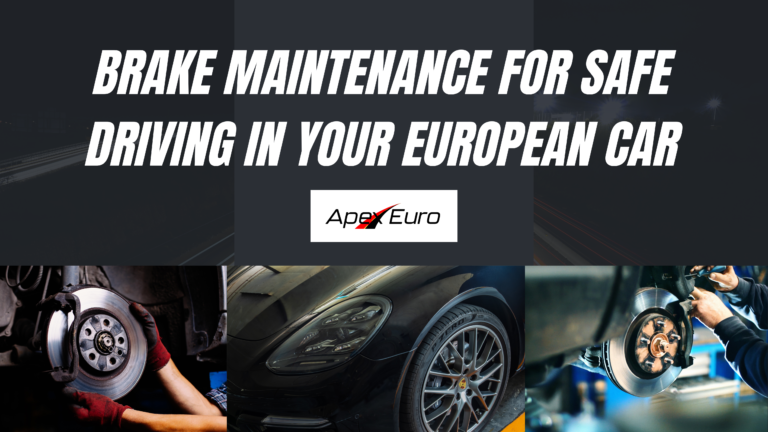Brake maintenance is an essential part of safe driving, especially when it comes to European cars. As a car owner, you need to take good care of your brakes to ensure optimal performance and avoid brake failure, which can lead to accidents. In this article, we will discuss brake maintenance tips for safe driving in your European car.

Importance of Brake Maintenance: Brakes are a vital component of any vehicle and require regular maintenance to ensure they function correctly. Neglecting brake maintenance can lead to decreased braking power, longer stopping distances, and, in worst-case scenarios, brake failure. Properly maintaining your brakes can save you money in the long run by preventing expensive brake repairs and replacement.
Signs of Brake Problems: It’s essential to pay attention to signs that your brakes may need attention. Some common signs include:
Squealing or Grinding Noises: If you hear high-pitched squealing or grinding noises when you apply your brakes, it’s a sign that your brake pads are worn and need replacing.
Vibrations: If you feel vibrations or pulsations through the brake pedal when you apply the brakes, it’s a sign that your brake rotors may be warped or damaged.
Soft or Spongy Brake Pedal: If your brake pedal feels soft or spongy when you apply the brakes, it’s a sign that there may be air in the brake lines or a problem with the brake master cylinder.
Brake Maintenance Tips: Regular brake maintenance can help prevent these problems from occurring. Here are some brake maintenance tips to keep your European car’s brakes in optimal condition:
Check Brake Fluid Level: Check your brake fluid level regularly, and top up if necessary. Low brake fluid levels can affect brake performance, and if left unaddressed, can cause brake failure.
Replace Brake Pads: Replace your brake pads regularly, according to the manufacturer’s recommendations. Worn brake pads can damage your rotors and reduce your car’s braking power.
Inspect Brake Rotors: Inspect your brake rotors regularly for signs of damage, such as warping or cracks. Damaged rotors can affect braking performance and cause vibrations through the brake pedal.
Bleed Brakes: Bleed your brakes regularly to remove air from the brake lines. Air in the brake lines can cause a soft or spongy brake pedal, reducing braking power.
Replace Brake Lines: Replace your brake lines if you notice any signs of damage, such as cracking or leaks. Damaged brake lines can cause brake failure.
Proper brake maintenance is essential for safe driving in your European car. Regularly checking and maintaining your brakes can help prevent brake failure, reduce stopping distances, and ultimately, keep you and your passengers safe on the road.
FAQs